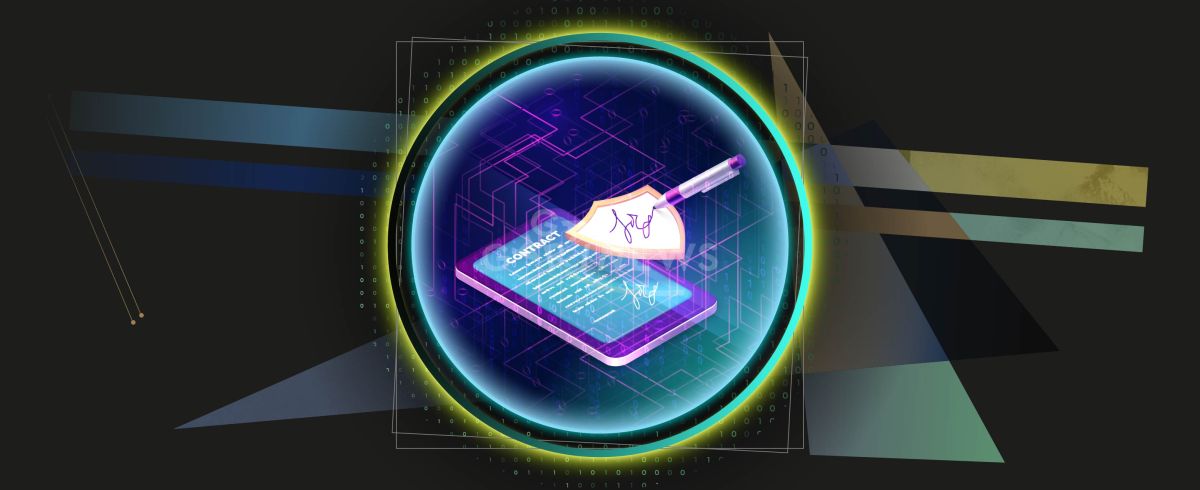Smart contracts – where and how they are used

Smart contract is a term closely associated with the digital asset market. Smart contracts are actively used in the decentralized finance (DeFi), with their help, voting in decentralized autonomous organizations (DAOs) is carried out.
On this page
A smart contract is a digital analogue of a conventional contract that functions autonomously in the blockchain environment. Checks the agreement terms fulfillment by all parties and conducts the necessary financial operations or calculations, using primarily digital assets, in particular cryptocurrencies, tokens, securities, intangible services, digital goods, etc. Transactions take place directly between the agreement parties without the participation of any intermediaries (notary public, state authorities, banks, etc.).
The main function of the smart contract (its mission, in fact) is that all signatory parties can successfully close the deal without the participation of any arbitrator (third party), provided that all mutual obligations are fully fulfilled.
How to create a smart contract
A smart contract is computer code created using high-level object-oriented programming languages such as Solidity, Vyper, Clarity, Move, Serpent, Fe, and others. There are already dozens of such programming languages to suit every taste and various blockchains.
The code contains a specific list of precise instructions in the if-then format that are automatically executed under certain conditions. A smart contract in real time verifies the occurrence of a certain condition and performs certain operations provided by the “smart” agreement algorithm.
Given that Ethereum remains the most popular platform for smart contracts, most programming languages are focused on this blockchain and its subsidiary ecosystems (Solidity, Vyper, Serpent, and others).
Smart contracts have become so popular that many blockchain platforms offer to use ready-made templates to create your own smart contracts even without knowledge of programming languages. To do this, with the help of a convenient interface, you need to fill in and activate a certain list of parameters, conditions and triggers – and voila, the smart contract is ready to be launched.
In what environment are smart contracts executed
Smart contracts are launched for execution in a virtual machine (VM). Such launch is similar to the ordinary contract taking effect after being signed by the parties.
On the Ethereum blockchain, this role is performed by the EVM (Ethereum Virtual Machine). It stores, manages and monitors smart contracts. Furthermore, it acts as a platform for performing transactions with all digital assets on the Ethereum blockchain. For the execution of a smart contract, as for any transaction, it is necessary to pay a certain commission in Gas, which is an internal monetary unit in the Ethereum environment.
Each first-level (L1) blockchain with the ability to create smart contracts has its own virtual machine. NeoVM on the Neo blockchain and Trust EVM on the EOS blockchain function similarly.
What are the smart contract types?
There are several smart contract types:
• centralized (with the possibility to change the agreement terms after launch partially or fully);
• decentralized (without the possibility of making changes after launch);
• combined (act simultaneously with paper media);
• hybrid;
• open (public);
• partially open;
• private (fully confidential).
How data is exchanged with the real world
Oracles are used to exchange data between the cryptocurrency world and the real world. It is they who supply smart contracts with data from open sources (databases, public registers, reporting, etc.) using open APIs or software methods. Oracles not only provide two-way communication between smart contracts and the outside world, but also minimize the substitution or manipulation of data from the outside.
Hybrid smart contracts are created in such a way that, while controlling the conditions programmed on the blockchain (on-chain), contracts simultaneously compare them with data received outside of the blockchain (off-chain). Oracles “work” precisely to fulfill hybrid smart contracts requests.
Where smart contracts are already actively used
Smart contracts are widely used in the cryptocurrency industry. With their help, it is possible to manage the emission of digital assets (issue standardized tokens) and decentralized autonomous organizations (DAOs), exchange assets on decentralized exchanges (DEX). Smart contracts are the basis of the various protocols functioning and decentralized applications (dApps).
In which areas smart contracts can potentially be used
In the future, provided the changes to the legal framework and widespread acceptance (legalization) of blockchain technologies the most progressive countries, smart contracts can be used in the following areas:
• accounting, distribution and property rights transfer (including will);
• transactions with securities/shares/bonds, etc.;
• eCommerce;
• banking, lending and insurance;
• financial reporting and accounting;
• taxation;
• medicine and health care;
• electoral law (for voting, elections or referenda);
• IoT (Internet of Things);
• logistics and cargo transportation, etc.
Pros & cons of smart contracts
Like any technology or software, “smart” contracts have their advantages and disadvantages.
Pros:
• saving time and resources (everything is fully automated and controlled by software);
• cost reduction (by eliminating intermediaries);
• absence of the human factor (no errors, delays due to performers, etc.);
• uniqueness, immutability and genuineness of data through the use of blockchain.
Cons:
• the presence of errors and “holes” in poor-quality smart contract code can lead to hacker attacks and asset theft;
• impossibility to write the code for all conditions and variants of the events development;
• the impossibility of predicting and timely recording the occurrence of force majeure circumstances;
• lack of a legal framework for the use of smart contracts.
The content on The Coinomist is for informational purposes only and should not be interpreted as financial advice. While we strive to provide accurate and up-to-date information, we do not guarantee the accuracy, completeness, or reliability of any content. Neither we accept liability for any errors or omissions in the information provided or for any financial losses incurred as a result of relying on this information. Actions based on this content are at your own risk. Always do your own research and consult a professional. See our Terms, Privacy Policy, and Disclaimers for more details.

























